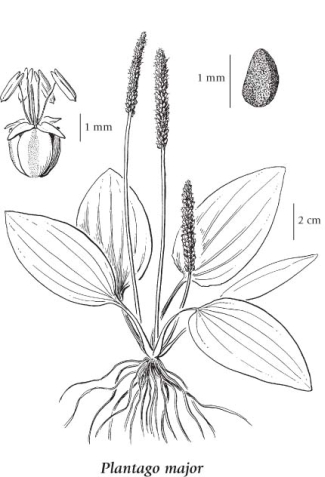common plantain
Plantaginaceae (Mare's-tail family)
Introduction to Vascular Plants
Introduction
Common plantain is a shade-intolerant, herbaceous perennial (sometimes annual) species with fibrous roots from a compact stem. Plants may be hirsute or glabrous. It is one of four species of Plantago found in BC and is widespread in the province. It is a common species on pathways and in areas of compacted soil across North America. It is a self-compatible, wind-pollinated, allergenic species that reproduces by seeds. Bassett (1973), in his monograph The Plantains of Canada indicated that the origin of this species had not been established and it was not known if it was native to North America or introduced. However, since that publication, many sources list it as an introduced species native to Eurasia (e.g. USDA 2010).
References: Bassett, I. John. 1973. The Plantains of Canada. Monograph No. 7. Research Branch, Canada Department of Agriculture, Ottawa. USDA. 2010. Plantago major. United States Department of Agriculture Plants Database. Available Onliine. |
Species Information
General:
Perennial herb from a fibrous root; stems erect, several, simple, smooth or stiff-hairy, 5-50 cm tall.
Leaves:
Basal leaves broadly elliptic to lanceolate or egg-shaped, tapered into long stalk, entire or irregularly toothed, 4-18 cm long, 2.5-11 cm wide, strongly parallel-veined; stem leaves lacking.
Flowers:
Inflorescence of dense, narrow, bracteate spikes, the spikes less than 1 cm thick, 5-30 cm long, smooth; corolla greenish, 4-lobed, the lobes deltoid, 0.4-0.5 mm long; bracts 2-4 mm long, thin-margined; stamens inconspicuous.
Fruits:
Capsules, egg-shaped, 2.5-4 mm long; seeds 5-25, black or brown, 1 mm long, finely veined.
Illustration

If more than one illustration is available for a species (e.g., separate illustrations were provided for two subspecies) then links to the separate images will be provided below. Note that individual subspecies or varietal illustrations are not always available.
Illustration Source: The Illustrated Flora of British Columbia
USDA Species Characteristics
Flower Colour:
Green
Blooming Period:
Late Spring
Fruit/Seed characteristics:
Colour: Green
Present from Summer to Fall
Source: The USDA
Ecology
The table below shows the species-specific information calculated from
original data (BEC database) provided by the BC Ministry of Forests and Range.
(Updated August, 2013)
| Site Information |
Value / Class |
||
|
Avg |
Min |
Max |
|
| Elevation
(metres) |
702 | 0 | 1877 |
| Slope
Gradient (%) |
3 | 0 | 35 |
|
Aspect (degrees) |
27 | 0 | 360 |
| Soil
Moisture Regime (SMR) [0 - very xeric; 4 - mesic; 8 - hydric] |
5 | 2 | 7 |
| Modal
Nutrient Regime
Class |
D | ||
| #
of field plots species was recorded in: |
97 | ||
| Modal
BEC Zone Class |
IDF | ||
|
All BEC Zones (# of stations/zone) species was recorded in |
BG(7), BWBS(1), CDF(4), CWH(15), ESSF(1), ICH(5), IDF(32), MS(3), PP(8), SBPS(2), SBS(12) | ||
|
Source:
Klinkenberg 2013
|
|||
Habitat and Range
Mesic to dry lawns, fields, roadsides and waste places in the lowland, steppe and montane zones; common in SW BC, less frequent elsewhere; introduced from Eurasia.Status Information
Synonyms
Synonyms and Alternate Names:
Plantago asiatica auct. non L.
Plantago halophila E.P. Bicknell
Plantago major subsp. intermedia (DC.) Arcang.
Plantago major var. asiatica auct. non (L.) Decne.
Plantago major var. intermedia (DC.) Pilg.
Plantago major var. pachyphylla Pilg.
Plantago major var. pilgeri Domin
Plantago major var. scopulorum Fr. & Broberg
Taxonomic Notes
"The family Plantaginaceae includes three genera and an estimated 250-275 species from diverse habitats throughout the world (Pilger 1937). In Canada, the family is represented by two genera containing seven introduced species and ten native species" (Bassett 1973).
References Bassett, I. John. 1973. The Plantains of Canada. Monograph No. 7. Canada Department of Agriculture. |